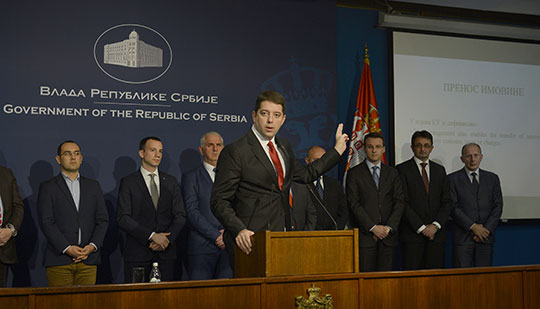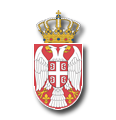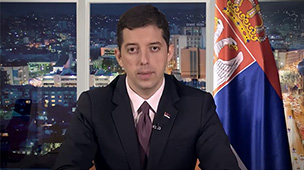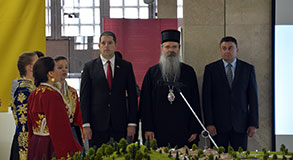Đurić: We are satisfied with agreement on telecommunications, dialing code +383 is property of Serbia
Serbian Government is satisfied with the agreement on telecommunications reached with Pristina, primarily with the fact that Telekom Serbia would continue to officially operate in Kosovo as a company which is legally recognized by the international community and by the provisional institutions of Pristina, the Director of the Office for Kosovo and Metohija Marko Đurić sTATED today, and underlined out that the dialing code +383 is the property of Serbia and will be assigned to Kosovo and Metohija as a geographical area.

" Now that it has been legally and officially recognized by the international community and by the Pristina institutions, our state-owned company will finally be able to operate legally in the territory of our southern province," Đurić said at a press conference convened to fully and accurately inform the Serbian citizens about all the elements of the conclusions made concerning implementation of the agreement made in 2013.
He added that the purpose of these conclusions is to normalize the operation of the telecommunications companies in our southern province.
"The Republic of Serbia and the Government of Serbia are satisfied that our assets in the territory of the southern province will be fully protected and preserved not only in our system, as that was never a question, but that now it will be protected and preserved under this agreement and the agreement that guarantees the transfer of assets to the subsidiary company of Telekom Serbia, ergo, it will be fully-owned by the Telekom Serbia and incorporated in our southern province, " Đurić explained.
Kosovo would, Đurić said, indeed get the dialing code +383, but not as the international dialing code, but as dialing code for a geographic area which is owned by the Republic of Serbia, "similar to China which owns several dialing codes: one for the mainland, and the rest for Hong Kong, Macau, Taiwan, or similar to the United Kingdom which has one for the mainland and the other for the Falkland islands ".
"Telekom Serbia and the Republic of Serbia remain the only members of the International Telecommunications Union, and this area code is at Serbia's disposal," Đurić said. He added that the Serbian citizens should not worry about additional charges nor about dialing phone numbers between the central and the southern province of Serbia, since calls would be charged as normal long-distance telephone traffic.
This agreement clearly defined the obligation to transfer the assets of the Telekom Serbia to its subsidiary company MTS d.o.o, to be established in Kosovo and Metohija, Đurić said, adding that it was also envisaged to increase the number and locations of the base stations and restore those that were destroyed in 2010 and 2011.
"This is an integral telecommunications system which has thus been preserved on the territory of Serbia. We managed to protect our interests, regardless of Pristina’s yet another false and distorted interpretation of an agreement," said Đurić.
He pointed out that it is not good that some political entities in Serbia, such as the Democratic Party of Serbia and the Dveri Movement, are criticizing the agreement rather than supporting it; not only that but they are repeating Edita Tahiri’s "fictitious arguments."
Director of the Office for Kosovo and Metohija also stressed that those employed by the Telekom would not have to worry about their continued employment, and that they would continue to fully enjoy their social and other rights.
“The specific details on regulating the relations between the Telekom Serbia and its subsidiary MTS d.o.o. is something that the lawyers are going to deal with. The important thing for workers is that they would continue their engagement within the framework of the Telecom Serbia, without any change in their employment status, " Đurić said, adding that the assets of Telecom in Kosovo and Metohija have been fully preserved.
Director of the Telekom Serbia Predrag Ćulibrk said that the signed agreement provides that the company would continue to operate and provide its customers in Kosovo and Metohija a better service and under the same commercial terms as in the rest of Serbia, adding that there will be no increase in cost.
"People would be dialing Central Serbia same as they have so far. This document provides absolute continuity and control over our property," said Ćulibrk.
He added that the company has been granted a license which ensures full legitimacy in the coming years to provide the highest quality of service in Kosovo and Metohija.
"From the perspective of Telekom and the Republic of Serbia, this agreement represents a good outcome after years of negotiations," said Ćulibrk.
Director of the Office for the Coordination of in the Process of Negotiations with the PISG in Pristina, Dragan Vladisavljević informed the press of technical aspects, the number of base stations, their location, area of coverage, etc.
As agreed, the International Telecommunications Union will assign the dialing code +383 to Kosovo, but will do so an asterisk and a footnote stating that the designation is without prejudice to the status, and in accordance with Resolution 1244, said Vladisavljević.
Commenting on the area of coverage, Vladisavljević explained that we have secured a much wider area of 25% of the territory, instead of the current 7%.





